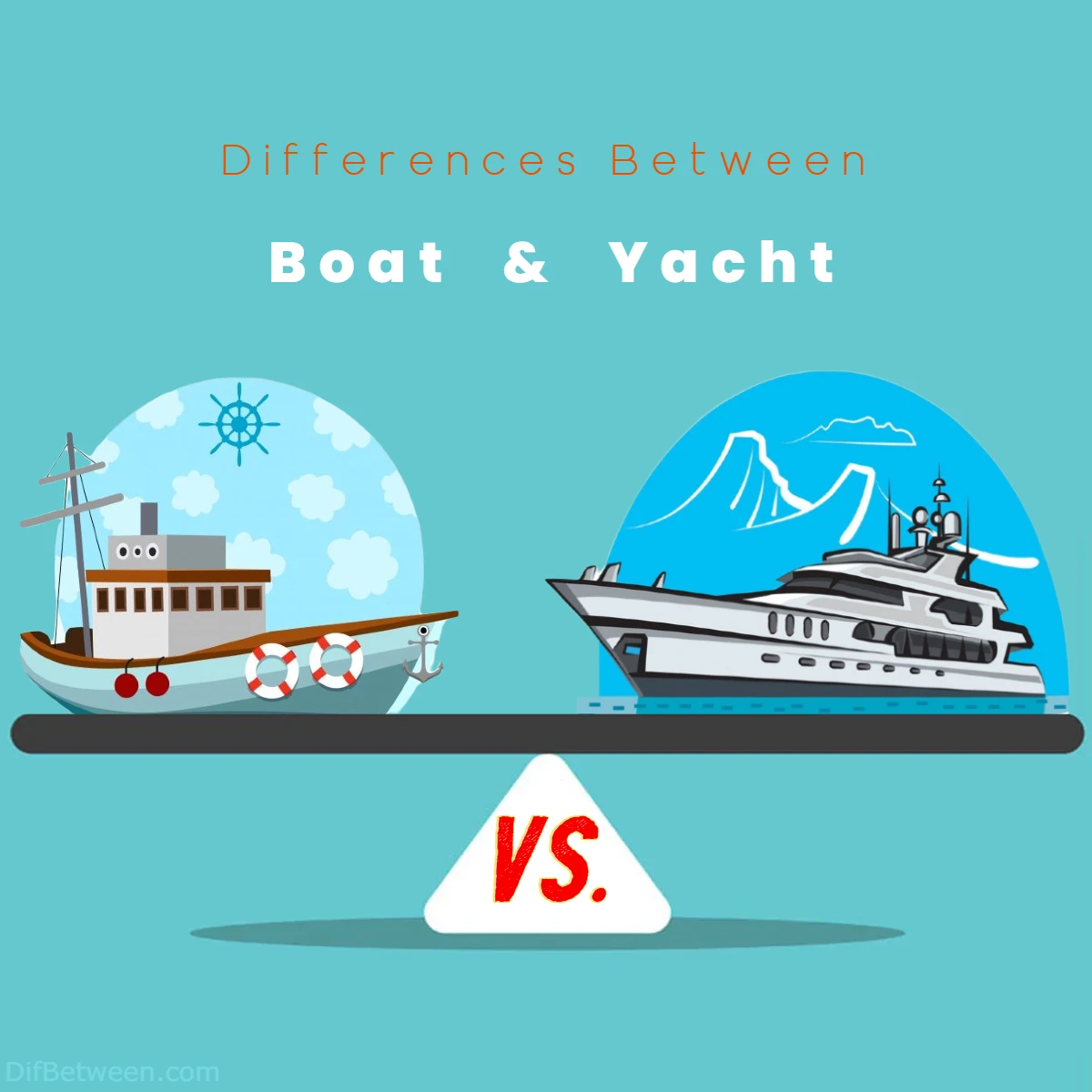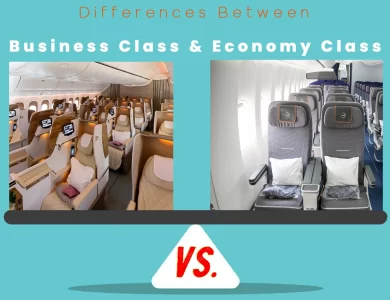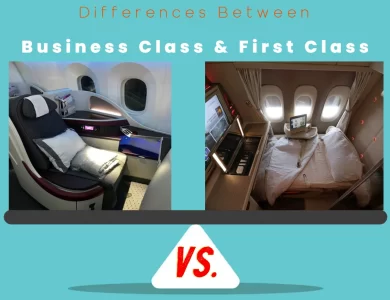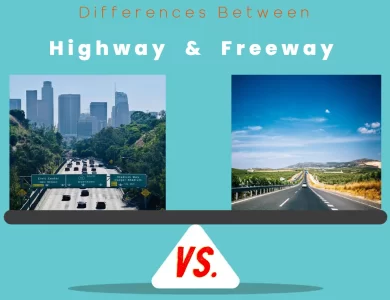
| Aspect | Boat | Yacht |
|---|---|---|
| Size | Typically smaller (< 30 ft) | Generally larger (> 30 ft) |
| Purpose and Design | Practical, tBoat vs. Yachtlored to specific activities | Luxurious, designed for comfort and leisure |
| Crew and Operations | Smaller crew or even a single individual | Larger crew to manage operations |
| Nautical Capabilities | Diverse capabilities for various purposes | Equipped for longer, more comfortable trips |
| Cost | Generally more affordable | Significantly higher cost and expenses |
| Social Status | Accessible, family-friendly activities | Symbol of affluence, exclusivity |
| Pop Culture and Media | Represent adventure and exploration | Symbolize luxury, wealth, and drama |
| Historical Evolution | Ancient transportation, evolved designs | Naval origins transformed into leisure use |
| Design Aesthetics | Practical, utility-focused designs | Elegant, luxurious interior and exterior |
| Environmental Impact | Minimal to moderate impact | Moderate to significant impact |
| Ownership and Accessibility | More accessible to a wider range | Exclusive ownership due to higher costs |
| Legal and Regulatory | Varies by size and purpose | Stricter regulations due to size and use |
From the small but nimble boats designed for fishing and watersports to the grandeur of yachts that redefine luxury on the water, the distinctions are as clear as the azure sky. Imagine steering a boat through tranquil coves, feeling the spray of the sea on your face, or reclining on the deck of a yacht, sipping champagne as you glide across the water like royalty.
Differences Between Boat and Yacht
The main differences between a boat and a yacht lie in their size, purpose, and luxury. Boats are generally smaller vessels designed for specific activities such as fishing, water sports, and short trips. In contrast, yachts are larger and more luxurious, often equipped with amenities like spacious cabins, entertainment systems, and gourmet kitchens. While boats offer practicality and accessibility, yachts symbolize opulence and exclusivity, catering to those seeking a lavish lifestyle on the water.
1. Size Matters:
Boat:
Boats come in a wide range of sizes, from small dinghies that can be easily carried by hand to modest-sized vessels used for fishing or short leisure trips. Generally, boats are characterized by their smaller dimensions and are often designed for specific purposes like water sports, fishing, or transportation.
Yacht:
Yachts, on the other hand, tend to be larger and more luxurious vessels. While there’s no strict size limit that defines a yacht, they’re commonly associated with being larger than most boats. Yachts often offer more amenities and are designed for comfort during longer voyages. These floating marvels can vary from mid-sized yachts that offer elegant cruising to superyachts that boast opulent features like swimming pools, multiple decks, and even helicopter landing pads.
2. Purpose and Design:
Boat:
Boats are designed with practicality in mind. Whether it’s a rowboat, a fishing boat, a speedboat, or a sailboat, boats are often tailored to suit specific activities. Their designs prioritize functionality, maneuverability, and ease of use. Boats are commonly used for recreational activities, fishing, watersports, and short coastal trips.
Yacht:
Yachts, while also serving as means of transportation across water, are designed to offer a higher level of comfort and luxury. They often feature spacious cabins, lounges, dining areas, and even multiple suites. Yachts are a symbol of leisure and are frequently used for extended cruises, entertaining guests, and hosting parties while on the water. Their designs focus on creating a lavish onboard experience, which can include state-of-the-art technology, gourmet kitchens, and sophisticated entertainment systems.
3. Crew and Operations:
Boat:
Boats are generally operated by a smaller crew or even a single individual. Smaller boats like kayaks, canoes, and small motorboats can be handled by a single person. Fishing boats or small sailboats might require a small crew to manage various tasks.
Yacht:
Yachts often require a more extensive crew to manage their operations. Depending on the size and complexity of the yacht, the crew can range from a few members to a substantial team. The crew can include skilled professionals such as captains, deckhands, engineers, chefs, stewards, and even onboard entertainment staff. This is necessary to ensure smooth navigation, maintenance, and to provide high-quality services to passengers.
4. Nautical Capabilities:
Boat:
Boats are designed with diverse nautical capabilities. They can be equipped with oars, sails, or engines, depending on their type and purpose. For example, sailboats harness the power of the wind for propulsion, while motorboats rely on engines. Boats are generally more agile and well-suited for shorter distances and specific activities like fishing or water sports.
Yacht:
Yachts are equipped with advanced navigational technology and powerful engines that allow them to cover longer distances more comfortably. Many yachts can be operated with minimal effort due to their sophisticated onboard systems, making them ideal for extended voyages and cruises.
5. Cost Considerations:
Boat:
Boats, being smaller and more practical vessels, generally come at a lower price point. Of course, the cost can vary greatly depending on factors such as the type of boat, brand, features, and materials used in construction. However, boats are usually more accessible to a wider range of enthusiasts and those seeking water-based recreational activities.
Yacht:
Yachts, being luxurious and often customized vessels, come with a significantly higher price tag. The cost of a yacht can range from hundreds of thousands to millions of dollars, with maintenance, crew salaries, and docking fees adding to the ongoing expenses. Yachts are typically associated with a more affluent clientele who can afford the lavish lifestyle and personalized experience they offer.
6. Social Status and Symbolism:
Boat:
Boats, regardless of size, are often associated with leisure and recreational activities. They’re great for spending a day on the lake, fishing, or exploring nearby coastlines. Boating can be enjoyed by people from various walks of life and is often seen as a family-friendly and approachable pastime.
Yacht:
Yachts are more than vessels; they’re symbols of opulence and luxury. Owning a yacht signifies not only a love for the sea but also a certain social status and level of affluence. Yachts are often used as settings for extravagant parties, corporate events, and celebrity getaways. They represent a lifestyle of sophistication and indulgence.
7. Pop Culture and Media:
Boat:
Boats have made their mark in pop culture as symbols of adventure and exploration. From classic literature like “The Adventures of Huckleberry Finn” to blockbuster movies like “Jaws” and “Pirates of the Caribbean,” boats play a significant role in shaping narratives centered around the sea.
Yacht:
Yachts, with their glamorous allure, have become staples in movies, TV shows, and celebrity news. From James Bond cruising on luxurious yachts to reality TV shows depicting the extravagant lives of the wealthy, yachts often symbolize a world of elegance, privilege, and drama.
8. Historical Evolution:
Boat:
Boats have been essential to human civilization since ancient times. They were among the earliest modes of transportation and were vital for trade, exploration, and survival. Archaeological findings suggest that boats date back to prehistoric times, crafted from materials like logs, reeds, and animal hides. Over the centuries, boat designs evolved based on local needs, available materials, and technological advancements.
Yacht:
The concept of yachts can also be traced back to historical roots, although their purpose has significantly shifted over time. The term “yacht” originates from the Dutch word “jacht,” meaning “hunt” or “chase.” In the 17th century, yachts were fast and nimble vessels used by the Dutch navy to pursue pirates and enemies. It wasn’t until the 19th century that yachts began to transform into leisure vessels for the affluent. Royals and wealthy individuals started using yachts for recreational sailing, sparking the luxury yacht industry that we know today.
9. Design Aesthetics:
Boat:
Boats come in various shapes and sizes, each tailored to specific functionalities. Their designs prioritize functionality and utility. Fishing boats have features like open decks and storage for fishing gear, while speedboats focus on aerodynamics for thrilling rides. The aesthetics of boats often revolve around practicality and purpose.
Yacht:
Yachts are designed with a keen eye for aesthetics and elegance. The interior and exterior of a yacht are carefully crafted to exude luxury and comfort. Yacht designers work closely with architects and interior decorators to create stunning living spaces that showcase fine materials, exquisite furnishings, and meticulous attention to detail. Yacht aesthetics encompass sleek lines, polished finishes, and opulent decor that elevate the onboard experience.
10. Environmental Impact:
Boat:
The environmental impact of boats can vary based on factors such as the type of fuel used, engine efficiency, and adherence to eco-friendly practices. Smaller boats, like kayaks and canoes, have a minimal carbon footprint as they rely on human power or non-motorized means of propulsion. However, larger motorboats can contribute to pollution and disturbance of aquatic ecosystems if not operated responsibly.
Yacht:
Yachts, especially larger ones, can have a more significant environmental impact due to their size and the resources required to maintain their luxurious amenities. Some yachts are designed with advanced eco-friendly technologies to reduce their carbon footprint, including hybrid propulsion systems and waste management solutions. However, the sheer size and energy demands of superyachts can still raise concerns about sustainability.
11. Ownership and Accessibility:
Boat:
Boat ownership is accessible to a broader range of individuals, from middle-class families to avid water sports enthusiasts. Small boats like canoes, kayaks, and small motorboats are affordable and can be owned by individuals with varying income levels. This democratized ownership allows more people to enjoy water-based activities.
Yacht:
Yachts, due to their high costs and ongoing expenses, are predominantly owned by the affluent. Owning a yacht entails not only the initial purchase but also maintenance, crew salaries, insurance, and docking fees. As a result, yacht ownership is limited to a smaller segment of the population with substantial financial means.
12. Legal and Regulatory Considerations:
Boat:
The regulations surrounding boats can vary by jurisdiction and vessel size. Smaller boats may not require licenses or permits for recreational use, while larger boats used for commercial purposes or navigation in certain waters may necessitate adherence to specific regulations, safety measures, and licensing.
Yacht:
Yachts are subject to more stringent regulations due to their size, capabilities, and potential impact on marine environments. Depending on the yacht’s size and intended use, owners and operators may need to adhere to international maritime laws, safety codes, and environmental regulations. Yachts used for commercial purposes, such as charters, must also meet specific legal requirements.
Boat or Yacht: Which One is Right Choose for You?
The vast expanse of the ocean calls, and you’re ready to answer its siren song. But before you set sail, there’s a critical decision to make: should you go for a boat or a yacht? Fear not, for we’re here to guide you through this nautical conundrum and help you discover which vessel aligns with your aspirations and lifestyle.
Boat: Embrace the Adventurer Within
Is a Boat Right for You?
If you’re drawn to the thrill of exploration, water sports, and the simplicity of navigating the waves, a boat might be your ideal companion. Boats are versatile, practical, and come in various sizes to match your needs. From kayaks for serene paddling to motorboats for water skiing, boats offer a direct connection with the water and a sense of freedom that’s hard to match.
Why Choose a Boat?
- Affordability: Boats are generally more budget-friendly, making them accessible to a wide range of enthusiasts. They’re a great choice for families, water sports enthusiasts, and those looking for day trips.
- Ease of Use: Boats are often easy to operate, and some smaller ones require no prior experience. If you’re new to watercraft, a boat can be a perfect entry point.
- Adventure and Exploration: With a boat, you can venture into shallow waters, hidden coves, and tranquil lakes that larger vessels might struggle to access. This opens up opportunities for exploration and unique experiences.
- Active Lifestyle: Boating encourages an active lifestyle, whether you’re kayaking along peaceful rivers, fishing in serene lakes, or enjoying the adrenaline rush of water sports.
Yacht: Sail into a World of Luxury
Is a Yacht Right for You?
If the idea of sailing the open seas while surrounded by opulent comforts and sophisticated luxuries tickles your fancy, a yacht might be your ultimate maritime dream. Yachts redefine elegance and offer an unparalleled level of indulgence, making them a choice for those seeking a lavish and exclusive sailing experience.
Why Choose a Yacht?
- Luxurious Experience: Yachts are synonymous with luxury. They offer spacious cabins, gourmet kitchens, entertainment systems, and a range of amenities that promise a lavish lifestyle on the water.
- Entertainment and Relaxation: Yachts provide ample space for hosting parties, entertaining guests, and simply unwinding in style. Some even feature onboard spas, cinemas, and multiple decks for various activities.
- Extended Cruises: If you yearn to sail across oceans and explore distant shores, a yacht’s comfortable accommodations and advanced navigation systems are tailor-made for long, leisurely voyages.
- Status and Prestige: Owning a yacht isn’t just about sailing; it’s a statement of affluence and social status. Yachts are often associated with celebrities, high-profile events, and a lifestyle of grandeur.
Making the Decision: Boat or Yacht?
Choosing between a boat and a yacht ultimately comes down to your preferences, budget, and intended use. Consider the following questions to help you decide:
- How do you envision your time on the water? If you’re seeking thrilling water sports and active adventures, a boat might be your best bet. If you’re more inclined toward relaxation, entertainment, and luxury, a yacht could be the perfect fit.
- What’s your budget? Boats are generally more affordable, making them accessible to a wider range of enthusiasts. Yachts, with their extravagant features and ongoing expenses, require a substantial financial commitment.
- Are you interested in long voyages? If you dream of crossing oceans and exploring distant lands, a yacht’s capabilities and onboard comforts make it the practical choice for extended cruises.
- Do you value exclusivity and status? Yachts are synonymous with prestige and luxury, making them the vessel of choice for those who want to indulge in opulent sailing experiences.
In the end, whether you choose a boat or a yacht, the allure of the open water and the promise of adventure await. So, hoist your sails or raise your champagne glass, for the sea beckons, and the choice is yours to make. Bon voyage on your maritime journey, whichever vessel you choose!
FAQs
The primary difference lies in their size and purpose. Boats are generally smaller vessels designed for activities like fishing and water sports, while yachts are larger and more luxurious, offering a lavish onboard experience.
Boats are typically smaller, often measuring less than 30 feet in length. Yachts, on the other hand, are larger vessels, usually exceeding 30 feet in length, and can range from mid-sized yachts to extravagant superyachts.
Yes, there are significant cost differences. Boats are generally more affordable, catering to a wider range of budgets. Yachts, with their luxury features and ongoing expenses, come with a much higher price tag, often in the millions.
Boats are designed for practical activities like fishing, water skiing, and short trips. Yachts are more focused on providing a luxurious experience, with amenities such as spacious cabins, entertainment systems, and gourmet kitchens, suitable for extended cruises and entertainment.
Boats typically require a smaller crew or can even be operated by a single individual. Yachts, especially larger ones, need a more extensive crew to manage operations, navigation, maintenance, and guest services.
Boats are associated with leisure and recreational activities, catering to a wide range of enthusiasts. Yachts, due to their luxury and exclusivity, symbolize a higher social status and are often linked to opulence and affluence.
Boats generally have a minimal to moderate environmental impact, depending on factors like engine type and responsible operation. Yachts, especially larger ones, can have a moderate to significant impact due to their size, energy consumption, and potential pollution.
Yachts are better suited for extended voyages and exploration due to their comfortable accommodations, advanced navigation technology, and onboard amenities that cater to longer trips across oceans and distant shores.
Boats have a long history as essential transportation tools, evolving from simple prehistoric vessels to diverse modern designs. Yachts originated as fast pursuit vessels used by the Dutch navy in the 17th century and later transformed into leisure vessels for the affluent.
Boats prioritize practicality and utility, while yachts focus on elegant and luxurious design aesthetics. Yachts often feature sophisticated interior and exterior designs, including fine materials and meticulous attention to detail.
Read More:
Contents
- Differences Between Boat and Yacht
- 1. Size Matters:
- 2. Purpose and Design:
- 3. Crew and Operations:
- 4. Nautical Capabilities:
- 5. Cost Considerations:
- 6. Social Status and Symbolism:
- 7. Pop Culture and Media:
- 8. Historical Evolution:
- 9. Design Aesthetics:
- 10. Environmental Impact:
- 11. Ownership and Accessibility:
- 12. Legal and Regulatory Considerations:
- Boat or Yacht: Which One is Right Choose for You?
- FAQs






